The artists and the editor took control of the X-Men's destiny.
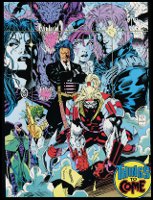
Click for Larger version
With legendary X-Men writer Chris Claremont gone, the artists got their way with the X-Men in 1991 and 1992. Having already plotted X-Factor #65-68, Jim Lee plotted X-Men vol.2 #4-11 and Uncanny X-Men #287, and Whilce Portacio plotted Uncanny X-Men #281-286 and 288 with occasional help from Jim Lee. Legendary X-Men artist John Byrne, who had since taken up writing, was brought in to script their drawn pages.
"It was very early in the run of a new book that we'd promoted a lot, so I had to figure out how I could give it a sense of continuity," editor Bob Harras told Comics Creators On X-Men. "What name other than Chris Claremont is most connected with X-Men books? John Byrne, of course. So I called John and we went with him."
"I wasn't coming up with the stories," Byrne stated in Arena Magazine #11. "I was just the hired typist, basically, to come up with the words."
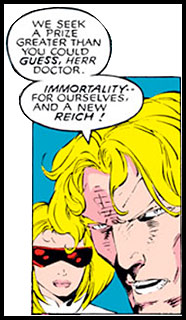
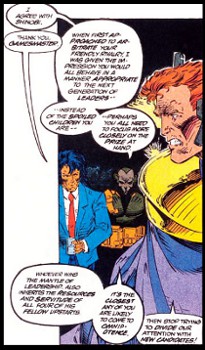
In Uncanny X-Men #281, Shinobi Shaw was leader of the Upstarts and self-appointed new king of the Hellfire Club. Upstart Trevor Fitzroy wished to wrest both titles from him. It was learned in Uncanny X-Men #283 that the Upstart competition was presided over by the Gamesmaster, who in turn was ruled by Selene of the old Hellfire Club. In X-Men vol.2 #5, Fenris and Matsuo Tsurayaba believed that the prize they competed for was immortality, but in Uncanny X-Men #283 Selene told Gamesmaster that the Upstarts didn't know the true nature of the game or the actual prize for which they strove so mightily. It was never revealed what devious prize Selene had in mind for the winner, and the subsequent writers, Scott Lobdell and Fabian Nicieza, never seemed able to settle on what prize the Upstarts thought they were competing for. In Uncanny X-Men #299 from 1993, the group was told by the Gamesmaster that the winner of the competition would inherit the resources and servitude of his fellow Upstarts. In Uncanny X-Men Annual #17, 1993, Trevor Fitzroy told new recruit Siena Blaze that the prize was omnipotence, and in New Warriors #45 from 1994, Shinobi Shaw thought that he would gain all of the players' combined powers.

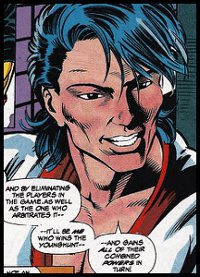
Trevor Fitzroy then turned on the group's founder, Selene, in Uncanny X-Men #301 in 1993 before getting killed in X-Force #33 in 1994. Fabian Cortez was killed off in Avengers #369 in 1993, written by Bob Harras, and Shinobi Shaw decided to concentrate on his Hellfire Club endeavors instead in X-Force #33, leaving just Siena Blaze, Graydon Creed and Fenris in the competition. The storyline ended anti-climactically in New Warriors #46 with Gamesmaster abandoning the competition without any winner being declared or any kind of prize being claimed.
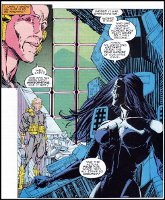 Click for Larger version |
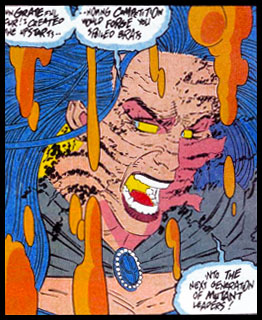 |
How John Byrne got replaced
John Byrne ended up only scripting X-Men vol.2 #4-5 and Uncanny X-Men #281-285 and some of #288. "Between X-Men and Uncanny X-Men, I think I only scripted six issues," John Byrne recalled in Comics Creators On X-Men. "The problem was the books were terminally late when I was asked to script them. Jim (Lee) and Whilce Portacio would both send me the plots and then they'd send me three pages of pencils. I'd script those because they had to be scripted right away and fax the scripts directly to Tom Orzechowski, who was lettering the book."
"Then I'd get one more and the one page didn't match the first three pages because they'd taken off on a tangent, and they were both doing this. So I was constantly writing and re-writing, and re-writing and writing and re-writing, and re-writing and writing. It was just a nightmare. I was working weekends, which I never used to do in those days."
"It was not the best situation," Bob Harras admitted to Comics Creators On X-Men. "John wasn't given much time at all to script those issues, and I could see that the pressure was unfair to him, and we probably weren't getting his best work."
"I finally threw the closest I get to a hissy-fit and I called up Bob and said, "This is nuts. The writer normally gets a month to do his job, I would like to have at least two weeks,"" Byrne told Arena Magazine #11.
""Something's gotta be done about this. This is insane,"" Byrne continued in Comics Creators On X-Men. "And Bob said, "We'll take care of it." Years later I was told, you should always be careful when Bob says, "We'll take care of it." What ultimately happened was about two weeks later, Terry Austin called me and said, "Hey, I hear Scott Lobdell is writing X-Men," and I said, "Huh?" And he says, "Yeah, at a barbeque at Berni Wrightson's place, some friend of Scott's was there and said he's just picked up the X-Men assignment." That's how I found out I wasn't writing X-Men. That's how they'd "taken care" of it."
The ascension of the High-Lords
Scott Lobdell had previously written some fill-in issues of Excalibur and a Nightcrawler/Wolverine team-up in Marvel Comics Presents #101-108 when he was offered the job of scripting Jim Lee and Whilce Portacio's X-Men starting with X-Men vol.2 #6 and Uncanny X-Men #286 in 1992.
"Scott (Lobdell) was a guy who hung around the X-office a lot," Bob Harras recalled in Comics Creators On X-Men. "When John (Byrne) decided to leave, I needed someone to script an issue fairly quickly. Scott just showed up at my office door one day, so I handed him the pages and said, "Okay, here's your shot." To Scott's credit, he turned the script in very quickly, and it wasn't bad."
When Whilce Portacio left Uncanny X-Men in 1992, Scott Lobdell stayed on and became the writer of the book. "He really "got" the characters," Bob Harras explained in Comics Creators On X-Men. "He also saw the core concept of the book more along the lines that I did. We were kind of simpatico. We didn't agree all the time, but the common vision was pretty much consistent."

Meanwhile, artist Rob Liefeld was plotting New Mutants and revamped the title into X-Force with Fabian Nicieza as the scripter. In X-Force #8, 1992, it was revealed that Cannonball was a High-Lord that would live well into the 24th century and that Cable had travelled from the future to Cannonball's present in order to protect him and ensure his ascension. While it was implied that Cannonball ascended by dying in X-Force #7 and coming back to life as an immortal High-Lord in X-Force #9, it was revealed in X-Force #10 that a group of mutant High-Lords existed, calling themselves Externals, and in X-Force #12, an "ascension of the Externals" was hinted at.
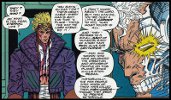 Click for Larger version |
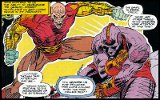 Click for Larger version |
When Rob Liefeld left X-Force and Jim Lee left X-Men vol.2 in 1992, Fabian Nicieza became the writer of both titles, as well as of the new Cable series. In X-Men vol.2 #23 from 1993 the Dark Riders' Hardrive told Cyclops that the battle for ascension of the High Lord would commence with Cyclops at the forefront of the killing fields in the "king of the world" contest.
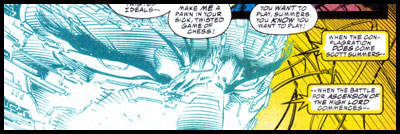
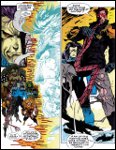
Click for Larger version
In Cable #1-3 and X-Force #25, 1993, it was revealed that in the future that spawned Cable, Apocalypse (En-Sabah Nur) and his Canaanites had won a hundred-year war against mutant clan families of which Cable belonged to the Askani Clan Chosen. The Canaanites sent Sinsear back in time to prevent the time-travelling Cable from threatening their control over the multitude of High-Lord ascensions and to ensure the cross-timeline ascension of External High-Lord Apocalypse.
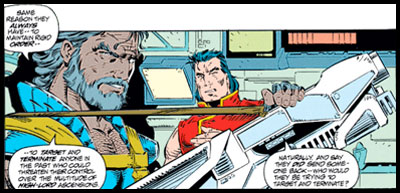
It was Cable's hope that Cannonball could be developed into a High-Lord that might someday in the future become mankind and mutantkind's saviour (by ascending instead of Apocalypse).
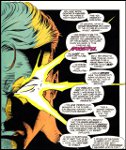
Click for Larger version
However, the battle for ascension of the High Lord never commenced, and in X-Force #54, 1996, written by Jeph Loeb, Selene killed off her fellow Externals save one whose identity was never revealed. But it might have been Candra, who was still around.
Selene also called Cannonball's High Lord immortality into question, saying that he wasn't an External, and that X-Force should ask Cable about Cannonball's supposed death and resurrection in X-Force 7 and 9, which they never did.
The coming of Armageddon
The only X-book written by an established writer at the time was The All-New, All-Different X-Factor, with Peter David of Hulk-fame launching the new group with X-Factor #71 in 1991. In X-Factor #88 from 1993, X-Factor went to Genosha, the island nation built on mutate slavery. "The Genosha storyline will () introduce a major new villain called Armageddon, who is going to be pulling together a lot of story threads, and helping give the entire book more of an underpinning and a feeling of its own backstory," Peter David announced in Marvel Age #122. "I will also be introducing a new character who will be joining and should be shaking up the mix a good deal - very mysterious extradimensional-type character."
"There will be things about (this new character) that I think will cause a good deal of debate among the readers. I want to try to add some mystery to the book, but a mystery that can be solved, instead of people just speculating wild theories. () I am trying to strike the balance of introducing this mysterious new character - about whom people can actually take some educated guesses - while making the book as fun as possible."
However, Armageddon and the extradimensional type character never appeared in X-Factor, although it was announced in Marvel Age #124 that X-Factor #91 would feature X-Factor versus Armageddon. Peter David left X-Factor with #89 in 1993 being his final issue.
"When Peter David left X-Factor, he had built up this plot over several issues that introduced this character called Armageddon," Scott Lobdell told Seriejournalen.dk. "He left, and I wasn't going to take over, but they asked me if I could come in and do a few issues until they found a writer. I called Peter up and said, "Peter, it looks like you've really put a lot of thought into this character. I'd rather you take the character and do what you want with it. I'll call him something else and I'll just come up with his motivation based on what I've seen." My understanding is that that character has since shown up in the Hulk, and he has been using him in that way."
Whomever Scott Lobdell thought of to replace Armageddon with never appeared, leaving readers hanging with an unresolved subplot from X-Factor #89 that featured the first and last appearance of a shadowed and unnamed Armageddon vowing to new Genoshan Director of Genetics, Sasha Ryan: "I swear the day will come that our country will once again be free of the genetic dregs known as mutants!"

Click for Larger version
How the X-Men were written
"We have meetings among all the writers, and we discuss things and hammer things out," Bob Harras told Wizard: X-Men Turn Thirty. "People have individual desires and plans and we have to make everyone as happy as possible in the long run. The final decision is mine - and I have to disappoint one person and make somebody else happy. We all want these meetings because you have to coordinate. We have lunches with Scott (Lobdell) and Fabian (Nicieza) a lot, and we have big meetings about twice a year now. Usually we talk about characters, which I think is the most important thing."
"I think the X-Men in general are very editorial driven," Bob Harras admitted to Seriejournalen.dk. "But I think because we work with people like Scott (Lobdell), it becomes a merging of what the writer wants and what the editor wants. I'd say very clearly that if what a writer wants doesn't fit the big picture of what the X-Men are about or where the general storylines are going, we do nix those stories."
"It's difficult because if you're writer, say, on Cable, and you're writing Cable and you have this great plan for Cable, but it doesn't fit with what we're planning to do in X-Force, or it doesn't fit with what's gonna affect Jean (Grey) and Scott (Summers) over in Uncanny, we gotta say, "You cant do that." That's where the editorial direction comes in. I'll say, "You can't do this and you can't do this because of this reason and because of that reason - how about if you do this? And then that'll have impact over there." So it's stressful being a writer on the X-Men and the books in general."
"The most difficult thing is that this is a shared universe," Bob Harras continued in Wizard: X-Men Turn Thirty. "That is extremely difficult to write, because nothing you write exists in a vacuum. Whatever you come up with will have an impact on the other books. That can be the fun part as well, because it's very exciting. Another writer might say, "Oh, I can do this with that character," and that can generate excitement. It can be tough, because it might force things in a direction the writer wasn't thinking of. Everyone wants to have their own baby, but when you have to share the kids, that's tough."
Why Peter David left X-Factor
"When you're doing comics in that kind of an environment, where everything is being coordinated and there's a great deal of gang mentality - "This must be done in this book, this must be done in this book" - and you start to reach a point where you realize, "I'm just too old for this crap," it can go a long way toward killing the spontaneity," Peter David told Wizard: X-Men Turn Thirty. "To my mind, it was no longer an environment I could work in consistently. Certainly other people can. Fabian Nicieza and Scott Lobdell have no trouble with it. God bless em. I wish them the best of luck. Marc DeMatteis is going to be dialoguing X-Factor - great. It's not something that everybody can do. It's a question of what you are individually capable of handling, and I just couldn't handle this anymore."
"If I had continued writing X-Factor, the story would have lacked - I think - whatever that ineffable quality called enthusiasm might be. I would have been doing it purely for the money. Writing something purely for the money and only for the money makes me a hack - and that's not fair to the editor, not fair to the fans and, ultimately, it's not fair to me. That, in a nutshell, is why I left the series."
"The minute you begin to integrate all the various books, the writer becomes less and less of a factor and the editor becomes more and more pre-eminent," ex-X-Men writer Chris Claremont opined in Wizard #22. "The editor is the person, presumably, who knows all the directions, who is aware of what everybody is doing, who can say "no" when people step on other people's toes. It's a very short step from that to saying, "Okay, you go here, you go there, you go there. This book goes that direction; I want this to happen in this book." Suddenly, as a natural evolution, the writer is the person who does what the editor tells him to write the book."
"You may goose in some stuff around the edges, you may throw in a line or a character that speaks to you, but these are grace notes on a symphony that's being written, fundamentally, by someone else. Why should I - or anybody worth the name - waste their talent executing someone else's vision, especially when you get into the moral question of why the person whose vision you're executing doesn't go write his or her own stuff?"
A parody of the X-Men
"What you have now are editors, in a lot of cases, who do not view themselves as facilitators but who view themselves as active participants in the production process," Claremont continued in Wizard #22. "They say, "I am going to tell you what the story is. I am going to decide the direction of the book. You will help enable us to get there" - rather than the writer coming in and saying, "This is where I want to go" and the editor saying, "Okay," or not. If you want to hire a writer to write the book, let him write it. If you want to write the book yourself, do that."
"The perception may be that, in a time when you cannot guarantee the quality of the writers, when you have to hold together a vastly expanding, convoluted, Gordian knot, cats cradle of continuity - maybe this is the only way they figure they can do it. I think it's wrong. I think you end up with a lot of second-rate work. By the same token, none of the people involved - save perhaps the editorial staff - have any long-term vested interest in what they're doing. It doesn't really matter what the work is - it could just as easily be making cars. You're producing stuff, you're not creating anything. It's the illusion of creation."
"I grant you that that's at odds with a lot of the audience. You go to conventions and signings and kids are saying, "Whoa! Did you see this? I love what's happening in Wolverine." Fine. But for me a lot of the books aren't what they were, and I'm left with the attitude, "Why bother?""
"Some people can view it as just pure pride in their work. I know Peter David takes tremendous pride in the work he does at the moment he does it, but once he leaves a series he doesn't care what happens next because there is not an ongoing relationship. There are times I wish I could divorce myself that completely, especially from the X-Men. I look at that and I think, this is my entire working life, up until two years ago, and it's taken them 18 months to gut it like a fish, to trash the characters, to kill off a tremendous amount of the context and cast, and to turn it into, to me, a parody of what it was."
Sources:
Tom DeFalco: Comics Creators On X-Men, April 2006
Marvel Age #124, May 1993
Patrick Daniel O'Neill: Claremont Returns With The Write Stuff, Wizard #22, June 1993
Patrick Daniel O'Neill: The Future Is Now, Wizard: X-Men Turn Thirty, August 1993
Evan Skolnick: Mutant Mouthpieces, Marvel Age #122, March 1993
Jerry Smith: John Byrne - Headed For The Future, Arena Magazine #11, July 1993
Tue Srensen and Ulrik Kristiansen: Interview With Bob Harras, seriejournalen.dk, 1995
Tue Srensen and Ulrik Kristiansen: Interview With Scott Lobdell, seriejournalen.dk, 1995
